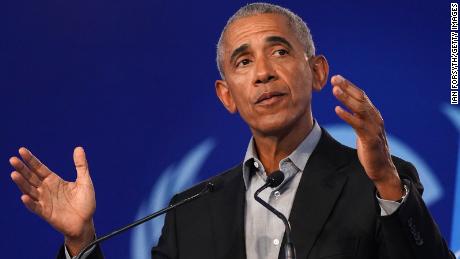Obama, speaking in the heart of Silicon Valley in Stanford, California, has been making the fight against disinformation a key pillar of his post-presidency. The debate over the spread of misleading information online has picked up significant urgency in the wake of falsehoods about Covid-19 and the outcome of the 2020 presidential election.
“Social media did not create racism or White supremacist groups. It didn’t create the kind of ethnonationalism that (Russian President Vladimir) Putin is enraptured with,” Obama said. “All these things existed long before the first tweet or Facebook Poke. Solving the disinformation problem won’t cure all that ails our democracies or tears at the fabric of our world. But it can help tamp down divisions and let us rebuild the trust and solidarity needed.”
The 44th President specifically called for tech companies to be more transparent about how their algorithms work.
“These companies are still way too guarded about how exactly their standards operate, or how their engagement ranking systems influence what goes viral and what doesn’t,” he said.
“For more and more of us, search and social media platforms aren’t just our window into the internet. They serve as our primary source of news and information. No one tells us that the window is blurred, subject to unseen distortions and subtle manipulations,” he said.
Obama argued that the design of major social media platforms relied on maximizing engagement so people spend more time on their sites.
“Unfortunately, it turns out that inflammatory, polarizing content attracts and engages,” he said. “Other features of these platforms have compounded the problem. For example, the way content looks on your phone, as well as the veil of anonymity that platforms provide their users, a lot of times can make it impossible to tell the difference between, say, a peer-reviewed article by Dr. Anthony Fauci and a miracle cure being pitched by a huckster.”
Referencing the role misinformation has played in the anti-vaccination movement in the United States and how it has promoted vaccine hesitancy, Obama said, “People are dying because of misinformation.”
The former President also said it was time for the US government to consider regulating parts of Big Tech, and possibly examining the role of Section 230 of the Communications Decency Act, which, in part, shields social media companies from being held responsible for what is on their platforms.
While Obama’s speech very much focused on the role of social media, he briefly mentioned the role traditional media can play in amplifying division or misinformation. In his memoir, he was critical of how mainstream news outlets handled the false “birther” conspiracy theory that was being pushed by then-private citizen Donald Trump a decade ago.
Obama’s critics have cited his infamous claim — “if you like your health care plan, you can keep it” — made during his presidency as evidence that he has occasionally pushed misleading information. Obama has rejected the comparison, saying at an event in Chicago earlier this month that the line was “not a threat to democracy” and “was not intended to somehow subvert the democratic process.”


